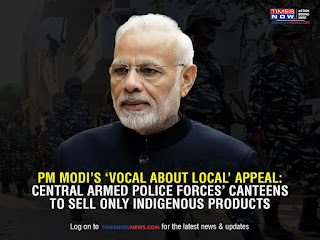REQUESTS of PM Modi
This happens in our brain due to "cognitive dissonance" This is because if someone asks us for a second favour,we make up our mind [assume] that we like them. And through his policy announcements, PM Modi doesn't give us an instruction nor an order. but he asks us for a favour, REQUESTS. For the Clean India Mission [Swachh Bharat Abhiyan]he [Modi] requested us 2 hours of our time, every week. For demonetisation, he [Modi] said we would have to face problems for some time. He requested us to return [give up] LPG subsidies, and even made a similar appeal [request]to clap for corona warriors. And, through such appeals where PM Modi asks us for favours, there are 2 advantages. First, his likeability increases as per Benjamin Franklin effect. And, in the second place, many responsibilities are moved from the PM towards the citizens. So even if these policy schemes don't work out,the Govt. will not be the only one responsible for it. Some portion of the blame [for its failure]would be on the citizens, too.
We had seen the direct evidence of this shift during Nov 2019, during the occasion marking the 70th anniversary of the adoption of our Indian Constitution, when PM delivered a speech that initially, emphasis[special importance] was given to citizen's rights [..."In the past 7 decades, we had emphasised(specially focussed) on our [citizen's] rights. & And, it was necessary, too. That was alright"...] But now, after 70 years of Independence, we have to shift the focus to the responsibilities of citizens. "...[But today, it is time to focus on the duties(responsibilities) of citizens along with their rights]...".
Maybe only to disassociate [disconnect] himself from the results, PM Modi doesn't give full details of any scheme. Like the Aatmanirbhar [Self-Reliant] package,PM Modi kept his focus on the number - 20. ["..INR 20 Lakh Crores in 2020(₹ 20,00,000,00,00,000).. "] But presenting the details was the responsibility of Finance Minister Nirmala Sitharaman. Due to this, when the performance of the Govt. is criticised,that criticism is not directed towards PM Modi Instead, it is directed towards the ministers like Nirmala Sitharaman or Piyush Goyal. Neelanjan Sircar, a political scientist argued [claimed] in his recent paper that In the 2014 elections, PM Modi relied on[believed in the slogan] Development ["Vikas"]. In the 2019 elections, he relied on[believed in the slogan] Trust ["Vishwas"].
He [Neelanjan Sircar] says that whenever the voter turnout [attendance] in elections increase, it usually increases for development ["Vikas"]. The same thing happened in 2014. Before the 2019 elections, Rural India [villages]already had an agricultural crisis [problem]. And, the rural voter turnout [attendance]increased in 2019 elections. But BJP's rural voter share too increased. If the 2019 elections, were just an election about development ["Vikas"], for the rural Indian voters they would have voted against the BJP. So, Neelanjan Sircar claims that the 2019 elections were about Trust ["Vishwas"]. PM Modi's spiritual image could explain this Trust ["Vishwas"].
["Is the Teflon image permanent ?"] Ayatollah Hashemi Rafsanjani was the 4th President of Iran. He was also called the "Teflon mullah." In the 1980s, he was involved in a secret deal with Iran's biggest enemy - America. Even after this secret deal became public,his image was intact [not damaged]. He was Iran's most vicious [aggressive] leader. and he became a leading political figure after the death of Ruhollah Khomeini in 1989. | And his influence was so great that people called him - King Akbar ["Akbar Shah"]. He was the president of Iran during 1989 - 1997. Even in 2005, he contested [participated]in the Presidential elections. In spite of being a front-runner,[famous & most likely winner] he lost to Mahmoud Ahmadinejad,an unknown political leader. There was no specific reason behind this defeat. Economic collapse due to a drop in oil prices, The lavish [rich] lifestyle of Rafsanjani & his family, were contributors too. But, an expert felt that there was one more reason. "He promised too much." And, couldn't deliver [fulfill the promises].
A lot of people might be familiar with this statement. In the last 6 years, PM Modi has made several promises. [..."The promise to make India $5 trillion dollar economy by 2024"...] | [..."By 2022, Farmers would be able to double their income"...] || [..."The day BJP gets to power, every penny of black money would be brought back to India"...] ||| Even before COVID-19, the Indian economy was on a downward trend. After COVID-19, it is predicted that India's growth would be negative. It doesn't mean that due to COVID-19,PM Modi will have to repay a political cost. This is due to his Teflon image. But this Teflon image is also not permanent,as we had seen in the example of Rafsanjani.
And, a change in this [Teflon] image would not happen with just 1 factor but through multiple factors like a better opposition, a serious policy mistake by the PM. An ideal [perfect] political environment is not the one in which all leaders are on the Velcro side. Instead, they should be in the middle of this scale. To do this, their supporters will have to start criticising[find fault with] them for decisions they are responsible. And, their opponents will have to stop criticising them for the decisions, these leaders were not responsible for Maybe then, there would be a change in this spiritual image of PM Modi.






Comments
Post a Comment